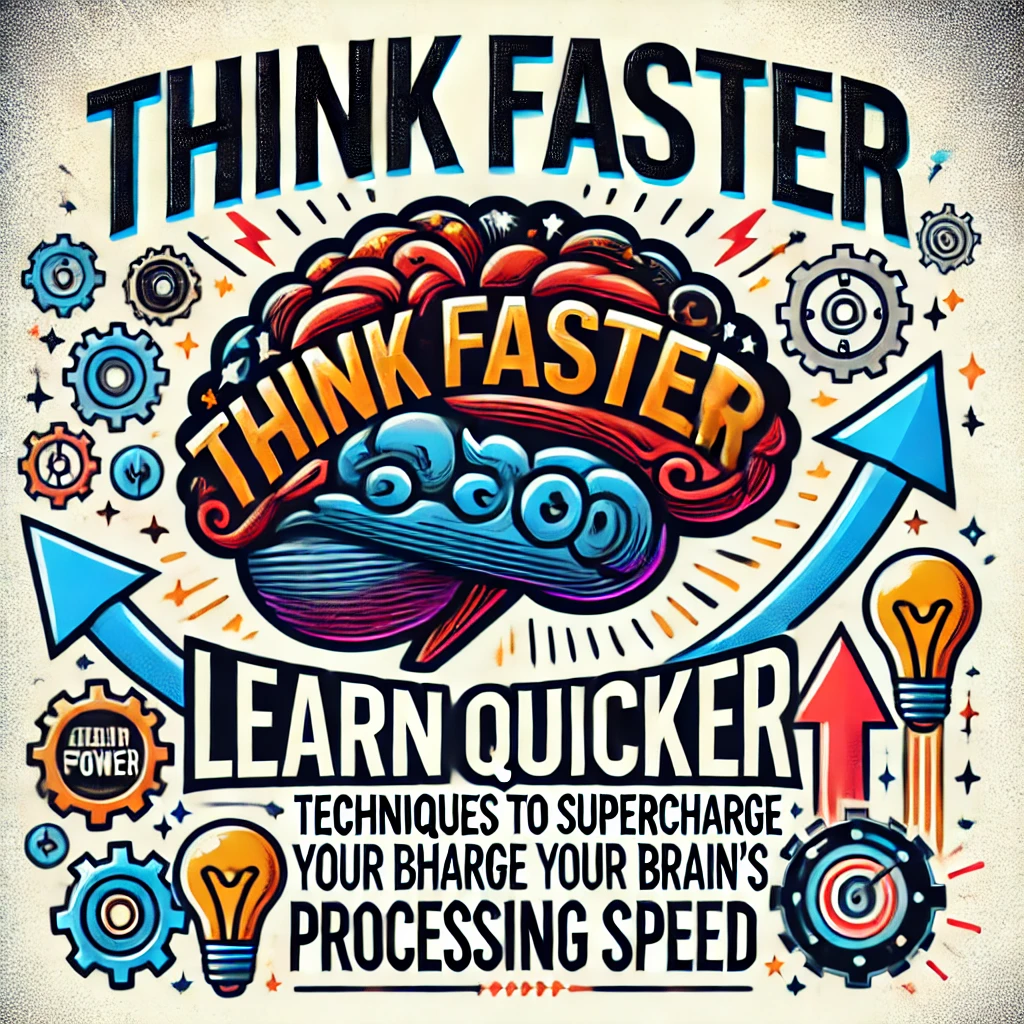Introduction
Imagine being able to think on your feet, grasp new concepts with ease, and retain information quickly—skills that could improve productivity, boost confidence, and reduce stress in everyday life. If you’ve ever wished for a faster, sharper mind, you’re in luck. By using specific techniques, it’s possible to increase your brain’s processing speed, enhance your learning abilities, and maximize mental clarity.
In this article, we’ll explore brain exercises for faster thinking, techniques to improve mental processing speed, and tips that will supercharge your cognitive abilities. From lifestyle adjustments to mental exercises, you’ll discover practical steps to unlock your brain’s potential and develop fast thinking and learning strategies.
1. Why Brain Processing Speed Matters
Before diving into the techniques, let’s understand why processing speed is essential. Processing speed is your brain’s ability to absorb information, process it, and respond accordingly. A faster processing speed means quicker thinking, better decision-making, and improved problem-solving skills.
Benefits of boosting brain processing speed:
- Enhanced focus and productivity: With faster mental processing, you can focus on tasks more efficiently, boosting productivity.
- Improved memory and recall: Increased processing speed helps strengthen memory connections, making it easier to recall information.
- Better reaction time and decision-making: A faster brain processes situations quickly, allowing for better responses in real-time.
Relatable anecdote:
I remember how much faster my colleague seemed to think when handling complex issues in meetings. It wasn’t until I started applying some of these techniques that I noticed an improvement in my own processing speed—and my confidence in meetings improved too!
2. Boost Brain Processing Speed with Mental Exercises
Mental exercises are one of the most effective ways to boost brain processing speed. Similar to how physical exercise strengthens muscles, cognitive exercises strengthen neural connections, improving both speed and accuracy.
Brain exercises for faster thinking:
- Speed drills: Use online tools or apps like Lumosity or BrainHQ, which are designed to improve mental processing and reaction time.
- Memory games: Games like “Simon” or memory card games challenge your brain to remember and recall information quickly, which strengthens your brain’s recall abilities.
- Dual N-Back exercises: This advanced exercise trains working memory and mental flexibility, which are crucial for fast processing.
Example:
I started using Lumosity for just 10 minutes a day, focusing on their speed and memory games. It’s amazing how quickly my brain adapted; I began noticing improvements in my everyday reaction times, whether it was finding information faster or remembering where I left my keys!
3. Practice Mindfulness and Meditation for Mental Clarity
While mindfulness and meditation may seem like they slow down the brain, these practices improve mental clarity, which in turn leads to quicker thinking and better processing. Meditation reduces stress and quiets mental chatter, allowing the brain to focus on tasks more efficiently.
How mindfulness enhances mental speed:
- Reduces mental clutter: A clear mind processes information more quickly, and meditation helps reduce unnecessary distractions.
- Improves focus and concentration: Regular mindfulness practice trains the brain to stay focused, making it easier to process information without interruptions.
- Enhances working memory: Meditation increases gray matter in areas related to memory and cognition, which improves processing speed.
Relatable anecdote:
A friend of mine, who was often stressed and scattered, began meditating for just five minutes each morning. Within a month, she noticed her thoughts felt more organized and focused. She said she could think more quickly, which helped her stay on top of work and personal tasks.
How to start a mindfulness routine:
- Begin with a few minutes each day, focusing on your breath.
- Gradually extend your practice to 10-15 minutes.
- Use guided apps like Headspace or Insight Timer if you’re new to meditation.
4. Use Visualization Techniques to Improve Mental Processing
Visualization isn’t just for athletes; it’s also a powerful technique to enhance mental speed. By mentally rehearsing actions and tasks, you create neural pathways that make these actions feel more familiar and accessible when you perform them in real life.
Techniques to think faster with visualization:
- Visualize success: Picture yourself successfully completing a task or recalling information quickly. This primes the brain to perform better.
- Mentally rehearse steps: If you’re preparing for an interview, presentation, or any task, imagine each step. This makes it easier for the brain to recall the steps when needed.
- Use mental imagery for memory recall: Associating images with information makes it easier to retrieve details, improving mental speed.
Example:
Before presentations, I started visualizing myself delivering each slide clearly and confidently. This mental rehearsal helped me remember key points faster, and I felt more in control during the actual presentation.
5. Incorporate Physical Exercise to Improve Mental Processing Speed
Physical exercise doesn’t just benefit the body; it’s also a powerful tool for the brain. Exercise improves blood flow to the brain, delivering oxygen and nutrients that enhance cognitive processing. Additionally, exercise releases neurochemicals that support memory, focus, and processing speed.
Exercise routines for faster brain function:
- High-intensity interval training (HIIT): Short bursts of intense exercise improve focus, memory, and brain speed.
- Aerobic exercises: Running, cycling, or swimming increases blood flow to the brain, improving processing speed and focus.
- Yoga and mindfulness-based exercises: Yoga combines physical movement with mental focus, helping to clear the mind and improve mental processing.
Relatable anecdote:
I used to feel sluggish and scatterbrained by mid-afternoon, but adding a 20-minute walk during lunch completely changed my day. It helped me feel refreshed and more focused, and I could tackle the rest of the day with a clear mind.
6. Optimize Your Diet for Brain Processing Power
The foods you eat directly affect your brain’s ability to process information quickly. Certain nutrients enhance cognitive function and support mental clarity, making them ideal for those looking to improve brain power.
Top brain-boosting foods for cognitive function:
- Omega-3 fatty acids: Found in fatty fish like salmon and flaxseed, these fats support memory and mental clarity.
- Antioxidants: Berries, nuts, and leafy greens help protect the brain from oxidative stress, which can slow processing speed.
- Complex carbohydrates: Whole grains provide steady energy, helping the brain maintain focus and process information consistently.
Example:
I started swapping out my morning sugary snacks for blueberries and nuts. I noticed I had more sustained energy and could focus for longer periods without feeling mentally drained.
Pro tip:
Start your day with a brain-boosting smoothie made from berries, spinach, and a tablespoon of flaxseed for sustained mental energy and clarity.
7. Challenge Your Brain with New Learning Opportunities
Learning new skills challenges the brain to form new connections, which keeps it adaptable and quick. This type of mental stretching, often called “neuroplasticity,” enhances cognitive processing and improves mental speed over time.
Ways to speed up learning abilities through new challenges:
- Learn a new language: Language learning exercises memory and focus, both of which improve processing speed.
- Play a musical instrument: Learning an instrument enhances coordination, memory, and processing speed.
- Pick up a hobby: Hobbies that require mental engagement, like painting or chess, stimulate the brain and improve reaction times.
Relatable anecdote:
When I decided to learn the guitar, I noticed that the mental focus it required was helping me think faster and remember things better in other areas of life. It was like a workout for my brain, and the benefits extended well beyond playing music.
8. Use Nootropics and Supplements Wisely
Nootropics, often called “smart drugs,” are supplements designed to improve cognitive function. While natural nootropics like caffeine and L-theanine are popular, other supplements like omega-3s and B vitamins can also support processing speed and brain health.
Effective nootropics for faster brain function:
- Caffeine and L-theanine: Caffeine boosts alertness, while L-theanine counteracts jitters, making it a popular combination for focus and processing speed.
- Omega-3 supplements: Omega-3s enhance memory and focus, supporting long-term cognitive health.
- B vitamins: B vitamins, particularly B6, B9, and B12, support brain function and energy levels.
Example:
A friend of mine drinks green tea before studying because it provides a focused, calm energy that helps him think quickly without feeling jittery.
Important note:
Always consult with a healthcare provider before starting new supplements to ensure they’re safe and suitable for you.
9. Practice Speed Reading to Process Information Quickly
Speed reading techniques help you absorb information faster, improving your brain’s ability to process content. By focusing on key information and minimizing distractions, you can develop faster comprehension and reaction times.
Techniques to practice speed reading:
- Use a pointer: Using your finger or a pen as a guide can help your eyes move faster across text.
- Avoid sub-vocalization: Try to minimize the habit of “saying” words in your head, which can slow down reading speed.
- Focus on keywords: Identify main points and key ideas instead of reading every single word.
Relatable anecdote:
I used to struggle with reading quickly until I practiced speed reading techniques. Not only did I get through material faster, but my comprehension improved too, which helped me tackle work tasks more efficiently.
10. Create a Stress-Reduction Routine for Optimal Processing
Chronic stress can impair processing speed, making it essential to incorporate relaxation techniques into your routine. Reducing stress supports mental clarity, helping you think more clearly and respond faster.
Techniques to manage stress and improve mental speed:
- Deep breathing exercises: Deep, controlled breathing calms the nervous system, improving focus.
- Progressive muscle relaxation: Tensing and releasing each muscle group relieves tension and promotes relaxation.
- Mindful breaks: Taking brief, mindful breaks throughout the day helps reset the mind, reducing stress and enhancing focus.
Example:
When I started taking mindful breaks every hour or so, my workday improved immensely. Instead of feeling mentally foggy, I stayed sharp and focused, especially in the afternoon.
Conclusion
Boosting brain processing speed is achievable through simple, intentional habits that help improve mental clarity, focus, and memory. From physical exercise and a brain-boosting diet to mental exercises and mindfulness, these techniques offer an array of ways to think faster and learn quicker.
Start by incorporating one or two techniques into your daily routine, then build on your progress as these habits become part of your lifestyle. With consistent practice, you’ll notice improvements in reaction time, memory recall, and focus, helping you reach peak mental performance.
FAQ Section
1. How does physical exercise improve brain processing speed?
Exercise increases blood flow to the brain, delivering oxygen and nutrients that support mental clarity, focus, and cognitive processing.
2. What foods boost brain function and processing speed?
Omega-3s, antioxidants (found in berries and nuts), and whole grains are great for brain health, providing energy and reducing oxidative stress.
3. Can meditation really improve mental speed?
Yes, meditation reduces stress and mental clutter, improving focus and allowing the brain to process information more quickly.
4. Is speed reading an effective technique to boost processing speed?
Speed reading can help by training the brain to identify key information more efficiently, improving both comprehension and recall.
5. What supplements are recommended for cognitive enhancement?
Common options include caffeine with L-theanine, omega-3s, and B vitamins, all of which support focus, memory, and processing speed.
6. How does visualization improve cognitive processing?
Visualization reinforces neural pathways, making it easier to recall information and mentally rehearse tasks, improving speed and confidence.
7. Are brain games effective for boosting mental speed?
Yes, brain games like memory and logic puzzles stimulate cognitive functions, enhancing processing speed and reaction time.
8. Does learning new skills improve processing speed?
Learning challenges the brain, forming new connections and improving flexibility and reaction times.
9. How does stress impact processing speed?
Chronic stress impairs focus and processing speed, so managing stress with relaxation techniques can improve mental clarity.



